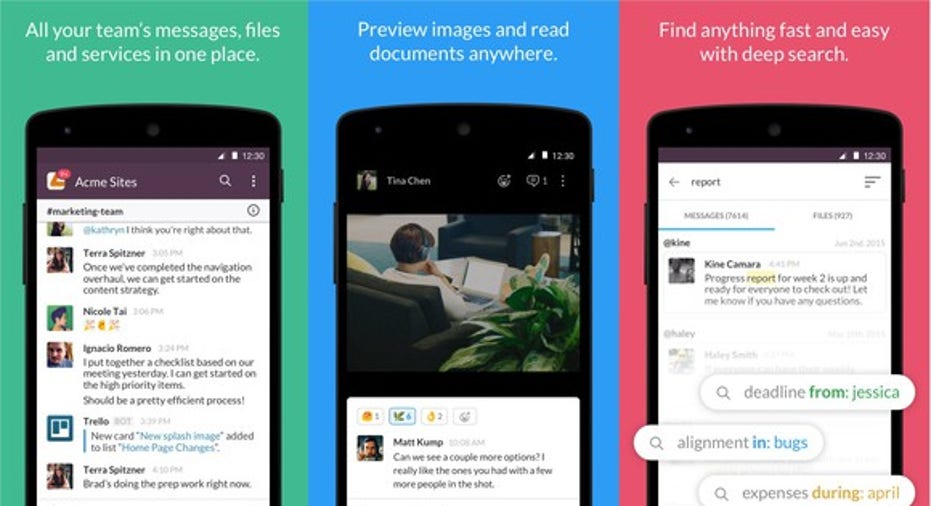Will Facebook's Workplace Bury Slack?

Facebook (NASDAQ: FB) recently invited all companies and organizations to try Workplace, the enterprise network formerly known as Facebook at Work. The service was previously only tested among select organizations over the past few years.
Image source: Facebook.
Facebook claims that over 1,000 organizations around the world now use Workplace, and that the platform now hosts over 100,000 groups. Its customer base includes multinational companies like Starbucks, non-profit organizations like Oxfam, and regional leaders like YES Bank in India. The company says that India, the U.S., Norway, the U.K., and France are the top markets for the platform.
Facebook's entrance into the enterprise social network market previously spooked investors in LinkedIn, which Microsoft (NASDAQ: MSFT) recently agreed to buy for$26.2 billion. But another casualty could be Slack, the rapidly growing mobile messaging start-up which hit a $3.8 billion valuation earlier this year.
What is Slack?
Slack replaces traditional email with chat rooms and private messages. Chatbots help organize company data, and numerous apps can be integrated into the platform. Slack is a freemium service, and its paid tiers add unlimited message searches, unlimited integration of apps, more cloud-based storage for members, additional layers of security, and other benefits.
Slack. Image source: Google Play.
Slack claimed to have three million daily active users in May -- triple the number it had at thebeginning of the year. Nearly a third of those users pay for the service. Slack expects to generate $64 million inrecurring revenue this year, which would be more than double the $30 million itexpected to generate last year. That top line growth looks robust, but Slack remains unprofitable.
Slack's top investors include venture capital firms likeAndreessen Horowitz, Social Capital, Accel, Spark Growth, andComcast'sventure capital arm. Last December, Slack launched an $80 million app investment fund with several of those firms to invest in apps (like chatbots) which can be integrated with its platform.
How dangerous is Facebook?
Facebook, however, is Goliath to Slack's David. With 1.7 billion monthly active usersworldwide last quarter and50 million business pages at the end of 2015, Facebook has the scale to render Slack obsolete. The social network is leveraging all the familiar features of Facebook -- News Feed, Groups, Live videos, Reactions, Search, and Trending posts -- to compete against platforms like Slack. For many users, that familiarity could make Workplace much easier to use than Slack.
Like Slack, Facebook is also investing heavily in chatbots, which many companies are already using in Messenger. Workplace also adds enterprise features like single sign-ons, an analytics dashboard, and identity providers which help companies integrate the platform into their existing IT systems. Facebook also recently added multi-company groups, which allow employees from different companies to collaborate in a secure environment.
Image source: Facebook.
It's also gathering an army with its Workplace Partner Program, a group of technology and professional services organizations which are working with Facebook to introduce Workplace to more businesses worldwide. Consulting giant Deloitte is already part of that program. This blitz could throttle Slack's growth, especially among larger companies which may prefer letting well-established tech giants handle their enterprise communications instead of unprofitable start-ups.
But Workplace isn't Slack's only rival...
Unfortunately for Slack, Facebook isn't the only tech giant eyeing the enterprise communications market. Microsoft, which reportedly considered buying Slack for$8 billion, recently decided to turn Skype into a Slack rival with "Skype Teams." The platform -- which will be integrated with Office 365 -- adds many ofSlack's popular features, like channels, file sharing, and private messages.
Coupled with the business profiles and data it's gaining from LinkedIn, Microsoft could evolve into a major threat in the enterprise networking and collaboration markets. It already has a great foundation to build that ecosystem upon -- Windows and Office are still mainstays for big enterprise customers. Other competitors like Atlassian, which owns a wide range of enterprise collaboration products, are also saturating the market with similar services.
Therefore, Slack must spend heavily and expand aggressively to keep growing at its current rate. If it can't, it could eventually be forgotten as companies like Facebook and Microsoft carve up the lucrative market.
A secret billion-dollar stock opportunity The world's biggest tech company forgot to show you something, but a few Wall Street analysts and the Fool didn't miss a beat: There's a small company that's powering their brand-new gadgets and the coming revolution in technology. And we think its stock price has nearly unlimited room to run for early in-the-know investors! To be one of them, just click here.
Leo Sun has no position in any stocks mentioned. The Motley Fool owns shares of and recommends Facebook and Starbucks. The Motley Fool owns shares of Microsoft. The Motley Fool recommends Atlassian. Try any of our Foolish newsletter services free for 30 days. We Fools may not all hold the same opinions, but we all believe that considering a diverse range of insights makes us better investors. The Motley Fool has a disclosure policy.



















